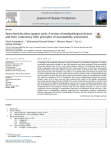Arulnathan V., Heidari M.D., Doyon M., Li E., Pelletier N. (2020). Farm-level decision support tools: a review of methodological choices and their consistency with principles of sustainability assessment. Journal of Cleaner Production, 10/05/2020, vol. 256, p. 1-15.
https://doi.org/10.1016/j.jclepro.2020.120410
https://doi.org/10.1016/j.jclepro.2020.120410
| Titre : | Farm-level decision support tools: a review of methodological choices and their consistency with principles of sustainability assessment (2020) |
| Auteurs : | V. Arulnathan ; M.D. Heidari ; M. Doyon ; E. Li ; N. Pelletier |
| Type de document : | Article |
| Dans : | Journal of Cleaner Production (vol. 256, May 2020) |
| Article en page(s) : | p. 1-15 |
| Langues : | Anglais |
| Langues du résumé : | Anglais |
| Catégories : |
Catégories principales 6.5 - Gestion des Exploitations ; 06 - AGRICULTURE. FORÊTS. PÊCHESThésaurus IAMM SECTEUR AGRICOLE ; AIDE A LA DECISION ; DEVELOPPEMENT DURABLE ; EVALUATION ; SECTEUR AGROINDUSTRIEL ; INDICATEUR DE DEVELOPPEMENT DURABLE |
| Résumé : | In response to the recognized importance of agri-food systems for sustainable development, a variety of sustainability assessment methods for agri-food production have been developed. These sustainability assessment methods vary in their scope, target audience, selection of sustainability themes and indicators, aggregation and time requirements. This review paper focuses on farm-level sustainability assessment tools (or farm-level Decision Support Tools (DSTs)). Such farm-level DSTs are generally characterized by their user-friendliness and reliance on simplified models with limited complexity. They are often considered useful for non-scientific decision-makers. However, there is limited understanding of the consistency of these DSTs with the principles and normative aspects of sustainability assessment. This study has reviewed 19 DSTs to characterize the common methodological choices that tool developers made. Each of these tools was then reviewed with respect to the Bellagio Sustainability Assessment and Measuring Principles (STAMP). The results showed that tool developers are often faced with trade-offs across different methodological choices such as scope of application, geographic scope, type of modelling and level of assessment. Our findings also revealed that only three of the 19 tools considered were at least partially consistent with all of the Bellagio principles. In order to ensure compliance with the principles of sustainability assessment, tool developers should start from a clear guiding vision of sustainability, explicitly understand and communicate essential considerations, improve transparency with respect to methodological decisions and better integrate the end-users into the tool development process. |
| Cote : | Réservé lecteur CIHEAM |
| URL / DOI : | https://doi.org/10.1016/j.jclepro.2020.120410 |







